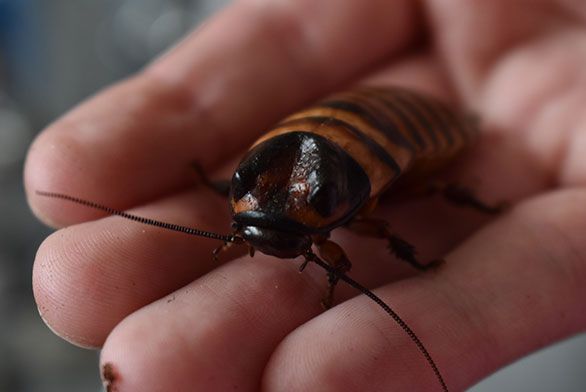Welcome to 'Bug Club'
In Annapolis, there’s a student group for seemingly everything under the sun—or, in this case, the log. Get to know the St. John’s College Insect Farming Club.
October 31, 2023 | By Meliha Anthony (A25)
Tabby Rutledge (A25) and Louis Rosenberg (A25) know that people think bugs are gross. They disagree, and want the students of St. John’s College to understand why.

On any given day in Annapolis, you might stumble upon croquet practice, swing dance lessons, or a baking club competition, all within a short distance of each other on campus. And, if you wander into Mellon Hall’s plant and animal room on a Friday afternoon, you may find yourself at a meeting of the Insect Farming Club–known colloquially as the campus bug club.
Insect farming refers to breeding and raising any insect species. The practice is gaining popularity as a method of cultivating more sustainable food sources but has a long history in the production of materials and substances like honey and silk. For the archons–leaders–of the St. John’s Insect Farming Club, the goal is to foster interest in entomology, the study of insects, through the observation and caretaking of bugs.
Rutledge and Rosenberg are working to educate the student body about the importance of the smallest members of our ecosystem. The two friends decided to start the club in the spring of 2022, when they realized their shared love for bugs.
“I really like the creatures that are kind of disrespected by people,” Rosenberg says.
As an “active process of caring for animals,” Rosenberg believes that Insect Farming Club is an important addition to campus life at St. John’s. At their meetings each week, the club provides a variety of activities; for example: bug-themed crafts, tending and feeding the insects, and readings on insect farming ethics. Both archons would like to incorporate more ecological and insect-related readings into the club’s repertoire. These readings have sparked important discussions in the past, Rosenberg says.
“Which lives do we value, and which lives do we value over, or place our own comfort over?” he asks. “Is it fair to just kill them because we don’t like them?”
The club started out with just silkworms, shortly joined by hissing cockroaches. The two club archons speak fondly about the bugs they have taken under their, ahem, wing, listing off their bugs’ names, abundant with literary references: Circe the millipede, Guinevere and Lancelot the rainbow stag beetles, and Pentheus the mealworm, to name a few. They also have a vinegaroon named Vincenzo–a bug that’s similar in appearance to a scorpion and gets its common name from the acid it shoots out of its tail, according to Rosenberg.
Rutledge recounts how mean people can be to bugs. She references the degrading comments people sometimes direct toward the insects when she and Rosenberg present them at club fairs. But, “it’s so important,” Rutledge says emphatically about entomology. “Most living things are bugs, I don’t think people give that enough credit.” Two-thirds of the world’s population, according to Rutledge, is made up of bugs.
Insect farming has huge ecological significance in an era when commercial farmers’ mass use of pesticides threaten bug species, and pollinators face colony collapse disorder. Rutledge notes that sadly, entomology is often studied to learn how to repel bugs for purposes such as agriculture. But that’s not all that observing and understanding the lives of insects is useful for, according to the archons.
“Resources that hobbyists have are important in conservation efforts,” Rosenberg says. “Knowing how insects behave in captivity can help us learn about how they behave in the wild.” This, according to Rosenberg, can help us learn how to better protect species that might be dwindling or endangered. Rosenberg describes the research he conducted for a summer course on the Lord Howe stick insect, a species once presumed extinct due to its extreme rareness. By breeding the small number of remaining bugs in captivity, the Lord Howe stick insect population was sustained – a triumph of insect farming.
Rutledge and Rosenberg list off some hypothetical club events and plans: providing more outreach and education about limiting our daily environmental impact, hosting a “bug zoo” for students to meet the insects, and holding a public debate about the invasive spotted lanternfly. In the spring, they will host their annual garden tea party with a grand butterfly release.
Ultimately, they say, bugs are just like us.
“They’re all different,” Rutledge says. “They have such personalities.”

